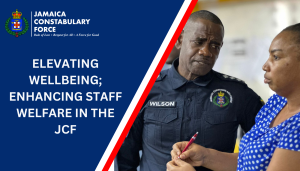
As the 81st Annual Joint Central Conferences of the Police Federation approaches, the fourth instalment in Police Commissioner Dr Kevin Blake’s series on the Jamaica Constabulary Force’s (JCF) Strategic Priorities couldn’t be more timely. This week in the Force Orders, Commissioner Blake delves into what he describes as perhaps the High Command’s most crucial endeavour: Enhancing Staff Welfare. In his candid message, he underscores the importance of caring for the wellbeing of the force’s members, who are, as he puts it, “our most important resource.”
Recognising the Centrality of Staff Welfare
Commissioner Blake opens with an unequivocal assertion about the centrality of staff welfare: “Strategic Priority number 4 Enhancing Staff Welfare is probably the High Command’s most important endeavour. It is so simply because our people are our most important resource and the achievement of all of the other 6 priorities wholly depend on our members.” This important recognition lays the foundation for a comprehensive welfare strategy that is supportive and essential for the overall success of the JCF’s mission.
Staff welfare encompasses a wide array of services and benefits aimed at ensuring the wellbeing of officers. Blake elaborates, “This is the organization’s ensuring your wellbeing through the provision of services and benefits. These include health and wellness administrative support such as paid time off personal development tools and equipment necessary to function amenities among other things.” This holistic approach acknowledges the diverse needs of the force, from physical health to professional development, underscoring the multifaceted nature of true welfare.
Acknowledging past shortcomings, Commissioner Blake admits, “While the JCF had always taken the responsibility of looking after Staff Welfare it was rather inconsistent and was the subject of justified criticism. There was no defined structure around the delivering of these services to our members that could ensure sustainability and the establishment of standards.” This candid reflection on the past sets the stage for understanding the necessity of a structured and sustainable welfare system that can consistently meet the needs of the force.
Emphasising Health and Wellness
Given the hazardous nature of police work, health and wellness services are paramount. Blake highlights, “By the nature of the job we do we are constantly exposed to health hazards ranging from natural illnesses to injuries brought about by occupational risks.” He further notes the risks associated with stress and unhealthy coping mechanisms, stressing the importance of proactive health and wellness support: “The long hours that we work under very stressful conditions sometimes encourages some members to seek relief in ways that are not the most healthy.”
Clarifying the Role of the Police Federation
Historically, the Police Federation has been a cornerstone of support for JCF members. However, Commissioner Blake clarifies a critical misconception: “It was generally accepted that the responsibility was more that of the Federation and less that of the organisation. This was a fallacy.” He emphasises that while the Federation’s support is invaluable, the primary responsibility for welfare lies with the JCF itself. “We can no longer seek to shun our responsibility of providing the necessary welfare services to you and ensuring your wellbeing.”
Establishing the Welfare and Wellness Branch
To institutionalize welfare services, the JCF established the Welfare Department in June 2018, which is now evolving into a full-fledged Welfare and Wellness Branch. Blake describes the transformation: “Under the leadership of Mr. Raymond Wilson, Superintendent of Police, the Department has performed excellently… However, even while doing so well it still remains a small Department with a huge undertaking.” This expansion includes appointing welfare officers in every division and formation, ensuring localised and immediate support for members’ welfare needs.
Reiterating a key organisational principle, Blake states, “For such an important responsibility to be institutionalized we have to ensure that ‘Form follows Function’ and as such the appropriate structure is being designed.” This principle ensures that the welfare structure is functional and integral to the JCF’s operational framework, embedding welfare into the organisational fabric and making Commanders co-responsible for the wellbeing of their members.
Commissioner Blake closes with a message of gratitude and a call to unity: “Thanks to you for your continued support to the mission; for following me in these columns; and for your patience with the High Command as we put in place these very important systems.” His words resonate with a shared vision of a transformed and supportive JCF, where every member’s wellbeing is prioritised.
As the Police Federation Conferences loom, this focus on enhancing staff welfare is both relevant and critical. It signifies a strategic shift towards a more supportive, resilient, and professional JCF, ready to meet the challenges of modern law enforcement with a foundation built on the wellbeing of its most valuable asset—its people.







